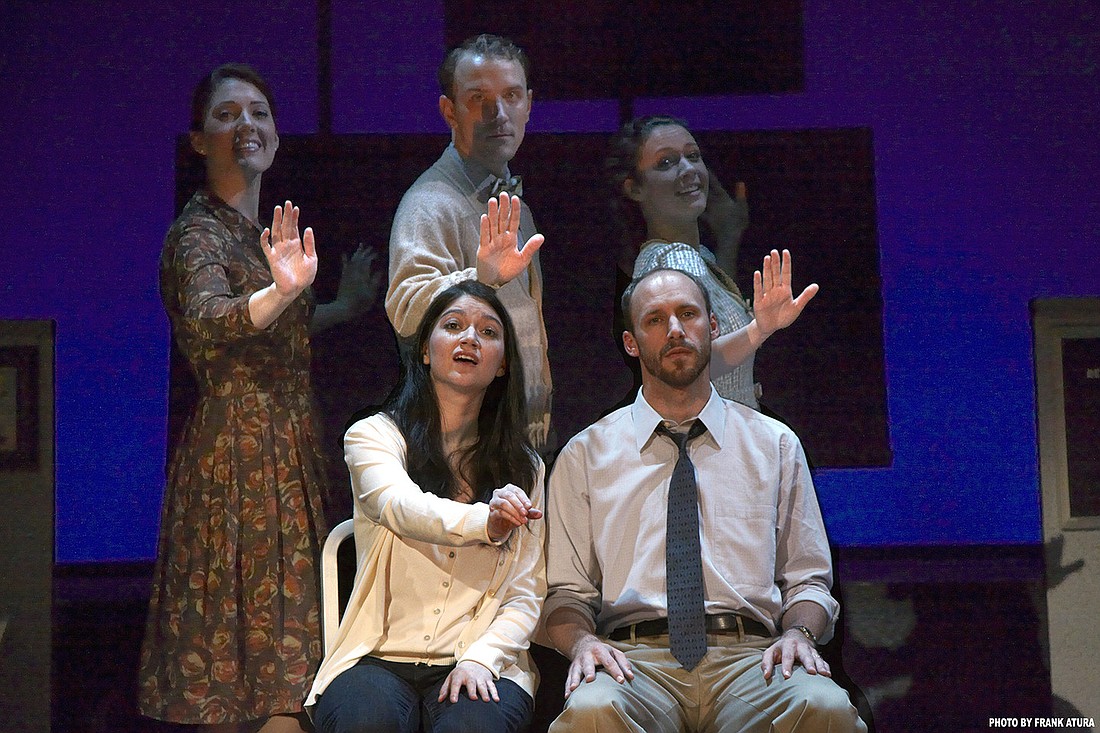- April 18, 2024
-
-
Loading

Loading

Pardon the understatement of the year — but child abuse is a difficult subject matter for stage and screen. It’s so difficult that it’s often conventionalized. The after-school special is the default approach: black-and-white villains and lessons to learn. Paula Vogel takes a different approach in “How I Learned to Drive.” You can see the results in the FSU/Asolo Conservatory’s current production of her Pulitzer Prize-winning play from 1997.
It’s a clever play. It’s a heartfelt play. It’s not an easy play. And that’s another understatement.
“How I Learned to Drive” explores the twisted journey of L’il Bit (Allie Henkel) and her Uncle Peck (Matthew R. Olsen). Said uncle stops short of legally actionable outrage: just occasional deniable groping, photo shoots and psychological manipulation. Uncle, in fact, is not some obviously sick monster, like the Peter Lorre pervert in “M.” He’s charming. He’s loving. That’s what’s so disturbing about him. Though, logically speaking, if all child molesters were scary, all children would run. The successful ones must be charming.
Their victims must think whatever happens is their decision. Or fault.
The playwright intercuts this dark history with an ongoing driver’s education lesson — both a class and Uncle Peck’s personal tutelage of his niece (which is how L’il Bit’s journey began). Structurally, the drive-alive tips are emotionally distancing: a frame between the audience and the raw truth.
Psychologically, the lessons speak of authority figures everywhere who take advantage of their pupil’s vulnerability and trust. And now I’m starting to sound like an after-school special.
Vogel never does. She’s not going for outrage. She wants you to know how L’il Bit feels — which the character tells you directly, as she relates her life story in bits and pieces: how her uncle charms and seduces her; how the sickness of one individual flows out of a larger family sickness. It’s the most painful show-and-tell imaginable — though punctuated with laugh-out-loud moments.
Director Jesse Jou stages this in a staccato series of vignettes. When they’re not doing the Brechtian Greek chorus thing, the other student actors take turns being L’il Bit’s other family members, students in the driver’s ed class and people from her past. The fragmented staging keeps you off-balance. Jou never telegraphs his punches — or gives you a chance to block them.
Henkel’s L’il Bit is not the standard-issue victim. She relates all of her horrors like a laid-back, stand-up comic telling stories about her crazy family. Anger and fear rarely creep in her voice. Her delivery is laconic, dryly amused and slightly surprised — as if the character can’t believe what she’s telling you. Henkel’s soft-spoken cool never gives the audience the easy-out of a daytime TV response. Olsen plays Uncle Peck as a gracious Southern charmer, in contrast to the coarse hicks in the rest of the family. He’s smooth, considerate, thoughtful, loving and supportive. He follows the devil’s modus operandi and appears as an angel of light (and doesn’t think what he’s doing is devilish). A tough role, but Olsen pulls it off.
Andrea Adnoff, Gracie Lee Brown and Paul Herbig shine in their mercurial performances as all the other characters. (I say “shine,” though all the other characters are usually creeps.) Adnoff shows comic chops as Li’l Bit’s fundamentalist grandmother and a member of the snotty Teenage Greek Chorus (who’d be right at home in one of Stephen King’s high schools). Brown has a stand-out comic scene as Li’l Bit’s mother, getting drunker and drunker and giving increasingly rotten dating advice. Herbig by turns is a trash-talking granddaddy, an obnoxious high school student and a waiter who looks the other way at an older man liquoring up an under-aged teenager.
Chris McVicker’s inventive staging transforms the accoutrements of a driver’s ed class (chalkboard, desks, etc.) into multipurpose props that can create any environment. The result is a constant, unsettling metamorphosis supporting the director’s rope-a-dope intention.
All this leads to no big lesson — ironic, considering the fact the play is staged as one big driver’s ed class.
“If somebody gives you the creeps, trust your feelings” is highly implied, but not directly stated. There’s no happy ending. L’il Bit survives her journey, but she’s damaged goods. She lives in her head, unconnected to her body. Uncle’s fate is worse. What's the point? This happened. That’s what it feels like. That’s the message. It makes for a lousy after-school special.
But it also makes for great theater.
IF YOU GO
“How I Learned to Drive” runs through March 9 at the FSU Center for the Performing Arts, 5555 N. Tamiami Trail, Sarasota. Call 351-8000 or visit asolorep.org/conservatory for more information.